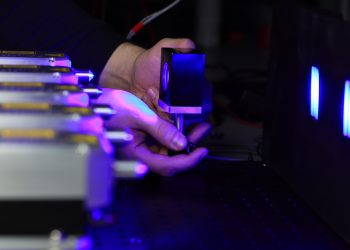When we’re looking at the world around us, our eyes are constantly readjusting and reassessing what we’re seeing – and new research shows how these shifts also involve a very brief period of ‘blindness’ when our vision is automatically blocked.
The research looks at the foveola, a tiny part of the retina that we use to see fine details. When we’re looking for someone in a crowd, or trying to see a road sign at a distance, it’s the foveola that we’re relying on to report back to the brain.
Our eyes make small and rapid gaze shifts called microsaccades when we’re looking closely at something, and the new study shows how these microsaccades also temporarily disable our vision – which overall seem to improve vision.
“We observed that microsaccades are accompanied by brief periods of visual suppression during which we are essentially blind,” says Janis Intoy, a vision scientist from the University of Rochester in New York and the study’s co-lead author.
“Our results show that the very center of gaze undergoes drastic and rapid modulations every time we redirect our gaze.”
How and when we shift our gaze is crucial to good vision – think of it like rotating a telescope to get a clear view of your surroundings. And the way the eye temporarily goes blind during larger gaze shifts, like looking to and from a computer screen, has already been documented and given the name saccadic suppression.
Here the researchers wanted to know if smaller gaze shifts worked in the same way.
Six volunteers tried to look for ‘fleas’ jumping on a ‘patch of fur’ on a computer screen. The volunteers were actually just looking at dots on a “naturalistic noise-field background” that simulated the fur of an animal. The volunteers would press a button on a joypad as soon as they saw ‘fleas’ jump.
A specialized eye scanner was used to record the foveolas of the participants while they were looking at the ‘fleas’ – and this revealed that they were unable to see the digital fleas immediately before and immediately after gaze shifts, even when they were apparently looking directly at them.
What this study doesn’t do is delve too deep into why this might be happening – but it’s likely to be a way of keeping our vision fixed and stable while our gaze is roving around, the researchers suggest. Further experiments should be able to reveal more.
“This brief loss of vision likely occurs so that we do not see the image of the world shifting around whenever we move our eyes,” says Intoy. “By suppressing perception during saccades, our visual system is able to create a stable percept.”
The eye scanning revealed that vision recovered rapidly at the center of the eye after these brief bursts of blindness, and then continued to improve – overall, vision in the eye was improved after the saccade or rapid movement of the eye.
These tiny moments of vision suppression happen so quickly that we’re not conscious that they’re happening, and nor are we aware of all the microscopic gaze shifts that go on while we look at what’s around us.
It’s only thanks to highly precise scanning tools that we’re able to get such a close look at the mechanisms going on in our eyes – and ultimately, understanding more about them can help scientists work out treatments and fixes when something goes wrong.
“In our lab, we have the high-resolution tools to study vision at this small scale, whereas other research has historically focused on the peripheral regions of the eye, where such precision and accuracy are not required,” says neuroscientist Michele Rucci from the University of Rochester.
The research has been published in PNAS.










:quality(70)/cloudfront-eu-central-1.images.arcpublishing.com/irishtimes/CGYPT6WE7VAO3KJ773SHUVMVBY.jpg?resize=1200,630&ssl=1)



